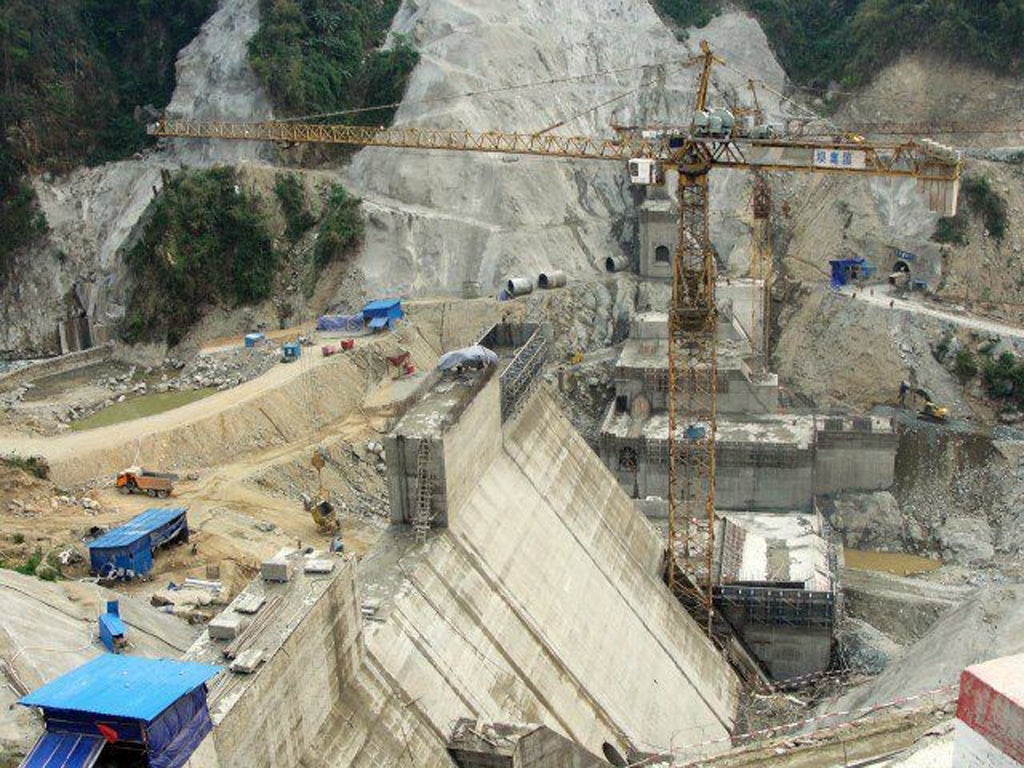Burma activists' joy as plug pulled on $2bn dam
Chinese project would have flooded an area the size of Singapore

Burma's government has called a halt to work on a multibillion-dollar dam project on the Irrawaddy river that activists claimed would displace thousands of people and threaten the ecology of one of the world's major water systems.
In a statement read out on his behalf before the country's fledgling parliament, President Thein Sein said work on the Chinese-backed Myitsone hydro-power dam project in the northern state of Kachin was to be suspended because it was "against the will of the people". He said no work would proceed as long as he remained in his post.
"We have to honour the wishes of the people and we have to consider and settle the concerns of the people," the statement said.
The decision threw activists and campaigners off balance. For months they had been waging a battle against the dam, saying it could have untold environmental and human costs. The opposition leader, Aung San Suu Kyi, who was freed last year after seven years of house arrest, was among those who voiced concern, suggesting that at least 20,000 people would be affected.
Last night, campaigners said they were encouraged by the government's announcement, but pointed out that the 6,000-megawatt Myitsone dam, which would have flooded an area the size of Singapore, is one of seven dams being planned in Burma on tributaries of the Irrawaddy, all of which could have a considerable impact.
"If the Myitsone project is indeed cancelled, this would be a great victory for the people of Burma, especially the brave villagers at the Myitsone site who stood up to the Burma army and refused to make way for the project," said the Burma Rivers Network, which is based in Thailand. However, the organisation pointed out that the site was still controlled by China Power Investment, a Beijing-based company building the dam.
"There needs to be an official statement by [the company] announcing this, and the Myitsone construction camps must be closed. Most importantly, the people who were forced to move must be allowed to return to their homes," the Burma Rivers Network added. The dam was to have been 152m (500ft) long and 152m high, and was expected to cost £2.3bn. It would have been an important source of income for Burma, which would have sold around 90 per cent of the electricity produced to China.
Last month, Ms Suu Kyi, the leader of the National League for Democracy, wrote an open later opposing the project. She said: "Ecological changes to the Irrawaddy would impact all those whose lives are connected to the great river, from the ethnic peoples in the northernmost state of our country to the rice-growing communities of the delta. To conserve the Irrawaddy is to protect our economy and our environment as well as to safeguard our national heritage."
Pitaporn Deetes, a spokeswoman for International Rivers, said last night that it was too early to describe the decision by the Burmese authorities as a victory. "I think it is important to see what steps the Burmese authorities are taking," she said. "Postponing one dam might not mean anything."
Activists said that as well as displacing people, the project would threaten the ecology of one of the country's most vital resources. It would also submerge a culturally important site in the ethnic Kachin heartland, where the Malikha and Maykha rivers meet to form the Irrawaddy.
The announcement by the government caught most observers by surprise. Thein Sein was made President in March after the military junta announced that it was disbanding and putting in place a civilian regime. Many Western commentators say that the government remains dominated by retired military officers and is at best a proxy for the old regime. About 2,000 political prisoners remain behind bars.
However, the authorities have taken steps to improve their image. For example, an interview with Ms Suu Kyi appeared in a Burmese publication for the first time this summer.
And yesterday, the 64-year-old held her third meeting with a government minister, Aung Kyi. Those who are looking for change say this is a sign of a continuing dialogue. Welcoming the decision to stop the dam, Ms Suu Kyi told the Associated Press news agency: "All governments should listen to the voices of the people."
Join our commenting forum
Join thought-provoking conversations, follow other Independent readers and see their replies
Comments
Bookmark popover
Removed from bookmarks